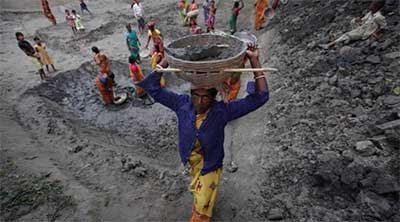Date: 15/10/2022
Relevance: GS-3: Welfare schemes for vulnerable sections of the population by the Centre and States and the performance of these schemes;
Key Phrases: Rural Development, Inclusive Growth, Covid Recovery, Rural Distress, Jobless Growth, MGNREGA, Legal Right, Guarantee Employment, Social Auditing, Know Your Rights, Job Printing Facility
Why in News?
- A report titled “Employment guarantee during COVID-19 — The Role of MGNREGA in the year after the 2020 lockdown” has been released recently by the Centre for Sustainable Employment.
- It shows the extent to which working under the programme provided income support to vulnerable households during the pandemic.
Key highlights of the report:
- There are 15.4 crore active workers under the MGNREGA as of 2022-23.
- The four States were surveyed by the team— Bihar, Karnataka, Maharashtra, and Madhya Pradesh.
- For households who found work in both periods (pre-COVID and during COVID), the increased earnings from MGNREGA were able to compensate between 20% and 80% of income loss depending on the block.
- For households who had not worked in the pre-COVID year but found work during the COVID year, MGNREGA earnings compensated between 20% and 100% of income lost from other sources.
- Despite low wages and payment delays, MGNREGA clearly made a difference during the pandemic, insuring some of the most vulnerable households against income losses.
- 3 out of 5 households said that MGNREGA contributed positively to overall development in their village.
Challenges faced by the Scheme:
- Lack of adequate work being sanctioned/opened: Across the eight blocks, on average 39% of households did not get a single day of MGNREGA work, and thus, the households could not be fully protected either because it did not meet their demand or were completely excluded them from the programme on account of the lack of adequate work being sanctioned/opened.
- Untimely payment of wages: On average, only 36% of all households that worked in the COVID year got their wages within 15 days as laid down by the Act.
- Inadequate Financing: MGNREGA is designed to absorb shocks such as the pandemic but to enable this, the programme budget should increase as per the demand for work but this did not happen.
What is MGNREGA?
- MGNREGA is a right to work programme that guarantees 100 days of employment to every rural household that demands work.
Salient features of the scheme:
- Right to work is a statutory right under the programme.
- At least one-third of beneficiaries should be women.
- Wages must be paid according to the statutory minimum wages specified by states
- Demand-Driven and legally-backed guarantee for any rural adult to get work within 15 days, if failed then ‘unemployment allowance’ should be given.
- Act promotes decentralization with a significant role to PRI in planning and implementation
- Mandatory provision of Social Audit
How can MGNREGA contribute positively to the overall development of villages?
- The MNREGA wage bill should be increased at least three times if all the “unmet demand” has to be fulfilled.
- The 100 days of work in a year under MGNREGA should be provided to each individual instead of each household.
- The programme needs massive expansion in order to deal with high work demand.
- The computerised receipts should be given to the workers for work demanded and the job cards must be updated with work done, wages earned, etc.
- Each panchayat must be equipped with a job card printing facility in addition to manual updating of information on job cards, similar to passbook updation facilities in banks.
- Wage slips with details of wages and work details must be printed and provided to workers after funds transfer orders are generated.
- ‘Know Your Rights (KYR)’ must be displayed concerning MGNREGA and banking rights in public places.
- It must be ensured that the GPs (gram panchayats) get funds in advance and have more authority in sanctioning works. This will ensure that the mandate of the 73rd constitutional amendment is honoured and work is available on demand.
- Social audits need to be strengthened with timely and adequate funds and all the agencies involved including payment intermediaries like NCPI (National Payments Corporation of India), banks, UIDAI (Unique Identification Authority of India), etc. must be brought within the ambit of social audits with clear penalty norms in case of violations.
Source: The Hindu
Mains Question:
Q. Examine up to what extent the programme, MGNREGA, has been able to contribute positively to the development of the vulnerable people. (250 words).






















